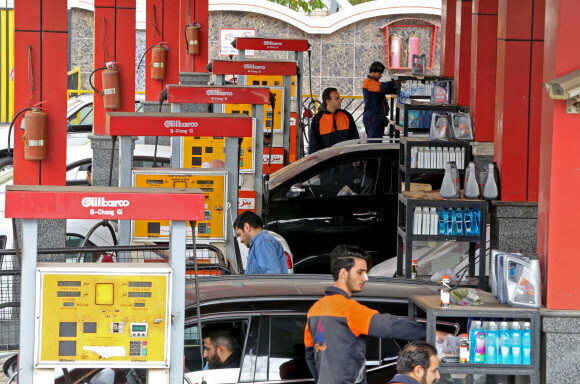hankyoreh
Links to other country sites 다른 나라 사이트 링크
S. Korea and Japan granted waiver in US sanctions on Iran as allies

When the US reinstated sanctions on Iran on Nov. 5 that ban buying oil or conducting financial transactions with the country, it announced that South Korea would be granted a waiver from the sanctions. While South Korea will have to substantially reduce its imports of Iranian crude oil, the domestic petrochemical industry has managed to avert a crisis, at least for the time being.
During a press conference, US Secretary of State Mike Pompeo and Treasury Secretary Steven Mnuchin announced that eight countries would be granted waivers from the sanctions, including South Korea, Japan, China, India and Turkey. The waivers for South Korea and Japan were granted because they are American allies, the Wall Street Journal concluded, whereas the waivers for India and China represent an attempt to allow some Iranian crude oil to reach the market to prevent a spike in international oil prices. The US’ full reinstatement of its sanctions on Iran came after the US withdrew from the Iran nuclear deal, officially called the Joint Comprehensive Plan of Action, which was concluded in 2015.
“During ongoing negotiations with the US government over the past six months, we persuaded the US to grant a waiver from the sanctions by emphasizing the importance of petrochemicals in the South Korean economy; the structure of the domestic petrochemical industry, which mainly uses Iranian condensate; and our position as an ally,” said a high-level official at South Korea’s Ministry of Foreign Affairs. South Korean’s petrochemicals account for about 20 percent of its total exports, ranking second after semiconductors.
South Korean petrochemical companies breath sigh of relif
One of the advantages of South Korea’s petrochemical sector is that turns condensate (ultra-light crude oil) from Iran into high value-added products, and the sector is facing sharp competition from Chinese companies that are in hot pursuit. Given this unique industrial context, imports of condensate (worth US$8.3 billion as of 2017) make up 74 percent of South Korea’s total imports of Iranian crude oil. South Korea’s Foreign Ministry said it could not disclose the amount of Iranian crude oil that its agreement with the US allows it to import. The sanctions waiver is valid for 180 days, with the possibility of an extension if the import volume is further reduced.
For now, South Korean petrochemical companies appear to be breathing a sigh of relief. “The challenges facing the purchase of Iranian condensate had us scrambling to secure a supply of condensate from Africa or Australia, so it’s encouraging to hear that we’ll be able to buy Iranian condensate after all,” one industry representative said.
The sanctions waiver allows the maintenance of the won-based payment system that is necessary for trading with Iran, which is expected to ease pressure on companies exporting to Iran. South Korean trade with Iran has been conducted through won-based payments for commercial transactions using won-denominated accounts controlled by Central Bank Iran at the Industrial Bank of Korea and Woori Bank.
“Without recognition of the won-denominated payment system, it would basically be impossible to conduct import and export deals. This is expected to be especially helpful for the considerable number of small and medium-sized companies in South Korea that specialize in exports to Iran, rather than large corporations that are capable of diversifying their transactions,” said an official with the Ministry of Trade, Industry and Energy.
By Park Min-hee and Choi Ha-yan, staff reporters
Please direct comments or questions to [english@hani.co.kr]

Editorial・opinion
![[Column] Park Geun-hye déjà vu in Yoon Suk-yeol [Column] Park Geun-hye déjà vu in Yoon Suk-yeol](https://flexible.img.hani.co.kr/flexible/normal/500/300/imgdb/original/2024/0424/651713945113788.jpg) [Column] Park Geun-hye déjà vu in Yoon Suk-yeol
[Column] Park Geun-hye déjà vu in Yoon Suk-yeol![[Editorial] New weight of N. Korea’s nuclear threats makes dialogue all the more urgent [Editorial] New weight of N. Korea’s nuclear threats makes dialogue all the more urgent](https://flexible.img.hani.co.kr/flexible/normal/500/300/imgdb/original/2024/0424/7317139454662664.jpg) [Editorial] New weight of N. Korea’s nuclear threats makes dialogue all the more urgent
[Editorial] New weight of N. Korea’s nuclear threats makes dialogue all the more urgent- [Guest essay] The real reason Korea’s new right wants to dub Rhee a founding father
- [Column] ‘Choson’: Is it time we start referring to N. Korea in its own terms?
- [Editorial] Japan’s rewriting of history with Korea has gone too far
- [Column] The president’s questionable capacity for dialogue
- [Column] Are chaebol firms just pizza pies for families to divvy up as they please?
- [Column] Has Korea, too, crossed the Rubicon on China?
- [Correspondent’s column] In Japan’s alliance with US, echoes of its past alliances with UK
- [Editorial] Does Yoon think the Korean public is wrong?
Most viewed articles
- 1‘We must say no’: Seoul defense chief on Korean, USFK involvement in hypothetical Taiwan crisis
- 2Will NewJeans end up collateral damage in internal feud at K-pop juggernaut Hybe?
- 3[Column] Park Geun-hye déjà vu in Yoon Suk-yeol
- 4Why Korea shouldn’t welcome Japan’s newly beefed up defense cooperation with US
- 5Thursday to mark start of resignations by senior doctors amid standoff with government
- 6N. Korean hackers breached 10 defense contractors in South for months, police say
- 7[Guest essay] The real reason Korea’s new right wants to dub Rhee a founding father
- 8[Column] ‘Choson’: Is it time we start referring to N. Korea in its own terms?
- 9Kim Jong-un expressed ‘satisfaction’ with nuclear counterstrike drill directed at South
- 10[Editorial] New weight of N. Korea’s nuclear threats makes dialogue all the more urgent